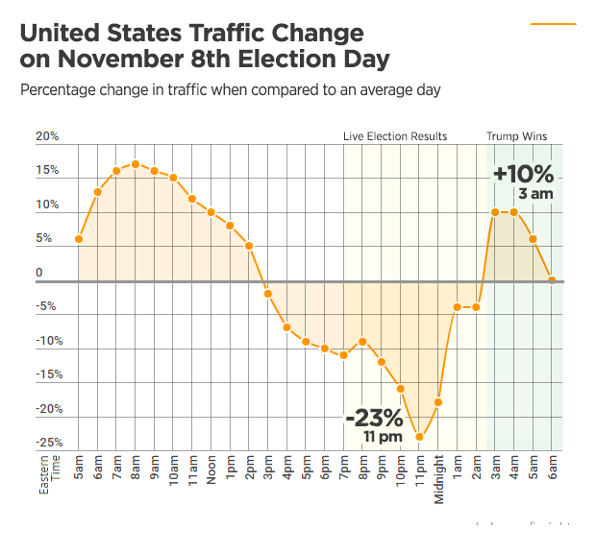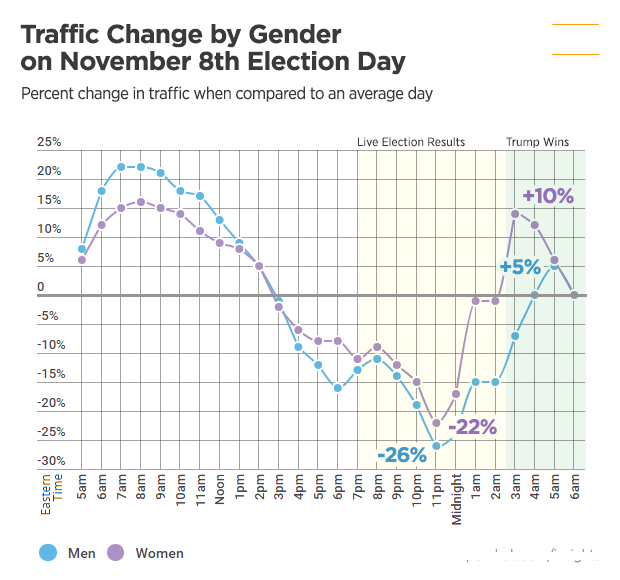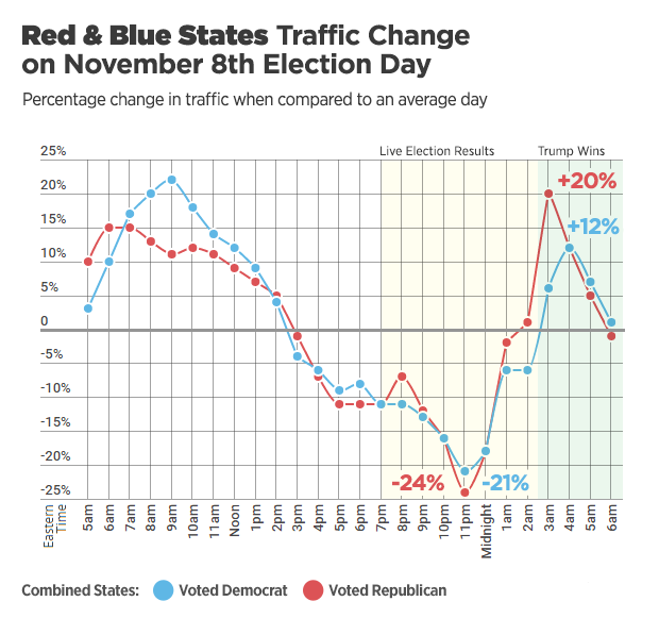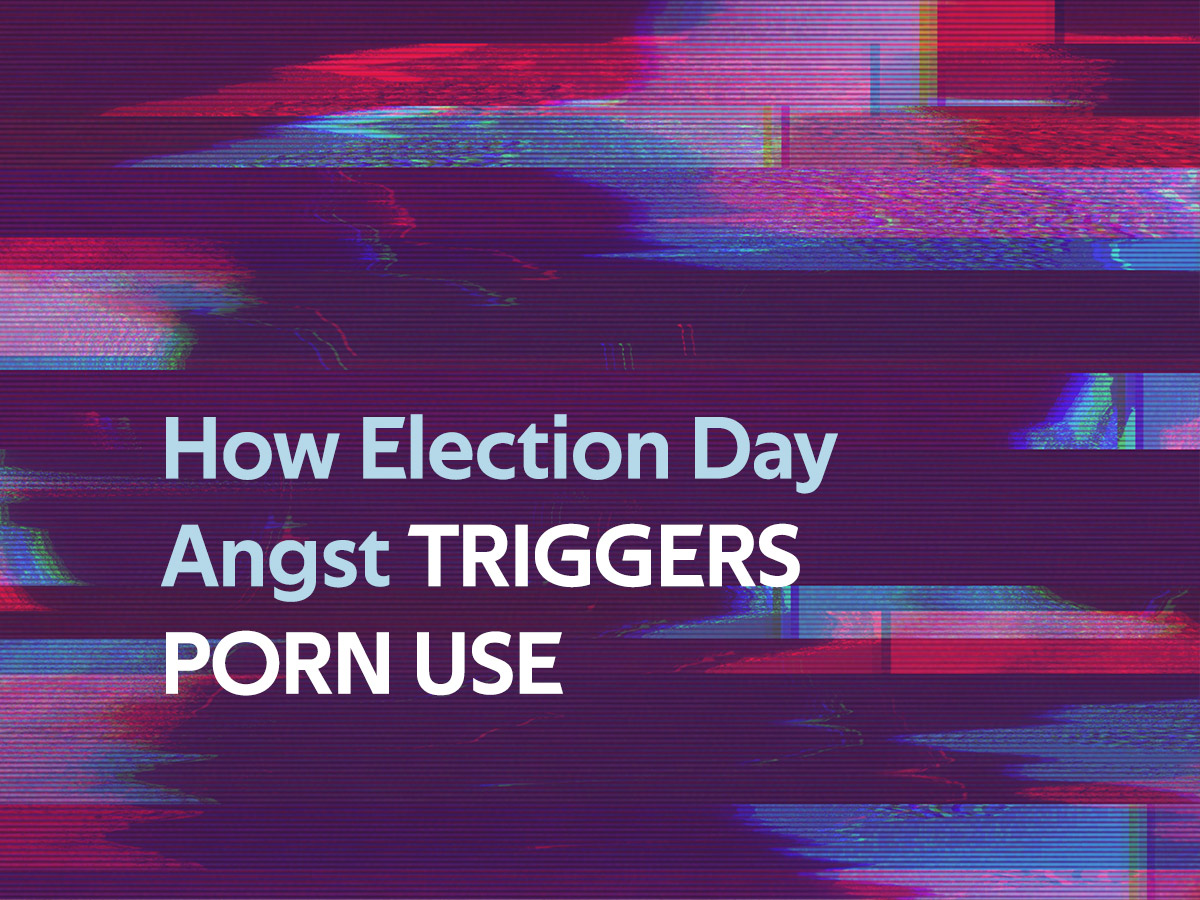If election day angst is triggering your porn use, you’re not alone.
Whether an article by CNN, Fox News, or a cantankerous post against “the other side” from a friend or colleague, there is no shortage of inflammatory election information. We are a nation in deep division and steeped in contemptuous vitriol. No matter who you are voting for (or if you are part of the 35-60 percent of eligible voters who don’t vote in any given election), you may have found yourself resigned to the belief that no matter who wins, we all lose.
Election Day and other important events will naturally intensify anxiety, disappointment, and hope and with it, the spread of porn use. Porn consumption is one of the best metrics of cultural attention we have. If porn use drops across the country, it typically means something nationally significant, like a political event or favorite pastime is occurring. If porn use increases, a significant event likely concluded minutes or hours prior. One example of this was during the 2017 NBA Finals when porn use dropped in the city of Cleveland at the beginning of game 5 and then increased nearly 34% after the Cavaliers lost to the Golden State Warriors.
Insights From The 2016 Election
On November 8th, 2016 Americans were awaiting the results of the election between Donald Trump and Hillary Clinton. On that day, the leading porn site in the world reported that U.S. traffic increased well beyond normal Tuesday levels, spiking as high as +17% at 9AM.
As election night progressed, porn traffic dropped well below average to –23% at 11PM EST as people around the country became increasingly fixated on their screens for the latest tally of electoral votes. At 2:30AM Eastern, Hillary Clinton conceded the election and porn traffic rapidly rose 10% above average. From 11PM – 2:30AM, pornography increased 33%.
 1
1
The Foundation of Our Trust
Our country’s pornography consumption is a mirror to us about the foundations of our trust. When we do not know how to soothe our anxiety, porn offers an easy temporary relief (at the expense of others). When we experience disappointment, we turn to porn to find comfort, reinforcing our belief that life will never get better. In the aftermath of success, many people use porn as a means of self-sabotage because they discover the object of their hope was insufficient as a source of fulfillment. The problems we choose not to face keep us in the same ruts of unwanted sexual behavior year after year and end up fueling the profits of an exploitive sex industry.
This article will explore how pornography exploits our anxiety, feeds on our disappointment, and exposes our false hopes. This election season will give us the opportunity to face our individual and national problems and elect whether or not to take greater responsibility for the words and actions we choose.
Porn Exploits Our Anxiety
If porn data from American history is any teacher, pornography use will begin increasing during the early morning hours of Tuesday, November 3rd 2020 and then gradually fall as we get closer to the final results. The morning of the election, anxiety will intensify, and we will turn to behaviors that give us the opportunity to reestablish control. 2020 has been a year (or has it been a decade?) of seismic shifts in the foundations of our life and many of us are hoping that our candidate will bring some stability to the collective madness of this year. Worse, this year we are unlikely to know the final results of the election for days (or weeks) to come, sustaining a protracted season of anxiety beyond election day.
As we saw with the coronavirus, when we face an uncertain future, porn use will rise. It should be exceedingly clear by now that we do not pursue porn because we long to immerse ourselves in beauty. We pursue porn because it gives us the opportunity to reestablish a lost sense of control. In porn, we are given an opportunity to get exactly what we want, precisely when we want it. Few other behaviors provide us with such an immediate (albeit temporary) reversal of circumstances. Rather than trying to use your mind to fight against using porn this election week, fight to pursue activities that help you engage your body.
We often think about anxiety as a troubling condition within our mind. In reality, anxiety resides far more within our bodies. In fact, the vagus nerve pathway transmits data at a 10:1 ratio from our body up to our brain versus our brain down to our body. Therefore, rather than trying to think or distract our way out of anxiety, we can view anxiety as a signal inviting us to a more embodied life. While most people focus on trying to reduce their anxiety through mental strategies, the more effective approach is to teach your body how to tolerate times in life that are inevitably stressful (practical examples at the end of the article). Anxiety is not your enemy, it is an invitation to kindness and connection.
Porn Feeds on Our Disappointment
After Hillary Clinton conceded the election, women increased their involvement in pornography 10% above normal levels while most men stuck around to watch Donald Trump’s acceptance speech. What we can tell from the election results was that women were anywhere between 12-13 percentage points more likely than men to have voted for Hillary Clinton (54% among women, 41% among men).

Hillary Clinton announced that her election night event would be held at the Javits Convention Center in Manhattan. The venue is built with glass, from top to bottom. One twitter user posted, “The place where Hillary will figuratively shatter the glass ceiling will literally have a glass ceiling.” As you can tell from the language of this post, many women (and men) were certain Senator Clinton would win and experienced a profound sorrow when she lost. Sorrow has to go somewhere and the way many women seemed to metabolize their anger and heartache was through pornography.
With many allegations of sexual assault against women from the 2016 Republican nominee for president, it’s a fair to assume that many women felt so much loss, amplified by the belief that so little would actually change within the glass ceilings of their lives. In the last 4 years President Trump’s ratings with women have continued to weaken and some believe it could cost him this election. With polls showing an even greater percentage of women voting for Joe Biden this year, a President Trump reelection would spell great disappointment for the majority of women across the country.
In facing and anticipating disappointment, we need connection. Sadly, so many of us opt for isolation. No matter who you vote for in 2020, you’ll likely experience some degree of loss. For some, that loss will be associated with your candidate’s defeat. For all of us, it will be the grief of how much civil and political ugliness took place on the journey to (and out of) this year’s election. So on the evening of November 3rd and the days and weeks that follow, the question we would benefit from asking is how can we pursue connection rather than vitriol and isolation in the midst of our grief or celebration? In isolation, we increase the probability of pursuing a pornographic world that leaves us even more severed.
If you do find yourself particularly disappointed this election season, consider the following:
- Give voice to your heartache. Shared grief can be one of the most uniting experiences in a year of perpetual disappointment.
- Remember. Our republic has survived far more turbulent seasons. Consider someone born in 1900. By the age of 39 they would have lived through World War 1, The Spanish Flu, The Great Depression and World War II (among other notable events).
- We have agency. Democracy is dependent more on our behavior toward those who differ than on how candidates behave.
- Intention determines outcome. Set an intention now for how you want to conduct yourself this election week.
Porn Use Exposes False Hopes
In 2016, 138 million people voted. That means tens of millions of individuals experienced victory and tens of millions of individuals experienced disappointment. You might expect that porn use would increase the most in the blue states due to disappointment. The porn data however showed something counterintuitive. Blue states certainly increased their involvement with pornography (+12%). But the largest increase actually came from red states with an increase of 20 percentage points above normal. In 2016, voting for the losing candidate drove porn traffic, but not nearly as much as voting for the winning candidate.

Porn use increases in blue and red states after an election because each of us are confounded by the nature of hope. Hope can influence us to feel disappointment for two very separate reasons. First, when we hope for something but do not receive it, we experience pain. Secondly, when we acquire something we were hoping for, we often realize that we hoped for something far less than what we truly needed. Let’s unpack both the pain and idolatry of hope.
How Hope Can Lead to Pain
There is an ancient Jewish proverb thatsays, “Hope deferred makes the heart sick…” The reason is that we are hope-based beings. Hope is like a beachball that you try to suppress under water. You can exert a lot of energy trying to keep it down, but it’s eventually going to rise to the surface because (in this case) buoyancy beats gravity. When the gravity of disappointment pushes our spirit down, something deep within us feels like we’ve been wronged. When our hope comes back void, we experience pain.
Each election cycle, our country puts its hope in a candidate or political party to conserve or progress American life. When the object (political party) of our hope is not elected, we feel a sickness of heart and find ourselves saying, “The United States will not conserve my desired way of life.” or “The United States will not progress in bringing liberty to those I believe most need it.” Whatever the outcome of the 2020 election may be, it is important to set an intention for how you will engage your pain and redirect your hope to that which an election cannot take away.
When We Hope in The Wrong Things
It is also possible to put too much hope in the wrong things. Whatever we place our hope in can eventually lead to disappointment because we expect the object of our hope to rescue us from misery or make our life complete. Depending on when you were alive in human history you might say, “If we could just appease the angry god, then we wouldn’t suffer so much.” Or “If I just get a good crop…”, or in 2020, “If the right president could just get elected or a vaccine got developed, then…” But of course, that hope never delivers the fulfillment we desire.When we put our hope in something more than it warrants or we make it an ultimate thing, we have made that hope into an idol.
Anytime we idolize something, we’ve outsourced our fulfillment to something that cannot deliver. By default, when our idol loses, we lose too. If we are honest, there are false hopes in nearly every realm of life. Examples include when we hope our romantic partner will help us feel better about ourself, but they end up being far more interested in having their needs met. It happens when we hope a certain salary or occupation will offer us satisfaction, but we end up having no time for the things that matter most. Or when we hope porn will reduce the pain of our loneliness, but it ends up intensifying it. In each of these examples, we lean on a false hope to escape the necessary crucibles that have the potential to mature us. Every false hope, no matter how legitimate it initially appears, is a construction of an idol.
When our hope proves to be insufficient, we enter a two-choice dilemma. Double down on what’s not working or abandon the idol in order to develop a more authentic hope. This election week will corner our nation with the agony of what it means to hope and will offer us the invitation to wean ourselves off of false, unfulfilling hopes. Hope at all and you might experience pain. Hope too small and you will feel duped by whatever it is you receive. Instead of putting your deepest hope in a political candidate, invest in a community that seeks to grow truth, justice, and beauty in your local context.
Election Angst Reveals What Needs to Heal
The problems we face individually and as a country cannot all be blamed exclusively on the election. The 2020 election is revealing the areas of life that await our attention. If we do not have a better solution for our anxious bodies, porn will be there. If we do not connect with others, porn will offer us surrogate companionship in isolation. The problems we face individually and nationally are how we grow. Let’s have integrity in the weeks ahead to love our neighbor and extend kindness to the angst within. Here are five ways to engage the latter.
5 Things You Can Do This Election Week
1.To regulate and tolerate our anxiety, attune to your body. We can do that through pursuing activities that engage the senses such as walking in a peaceful setting, yoga, meditation, cooking a new recipe, singing, and prayer.
2. We can also use our mind to help tame our anxious bodies. Daniel Siegel, clinical professor of psychiatry at the UCLA School of Medicine sums this up with the simple and elegant phrase “name it to tame it.” When our thinking and rational brain (cortex) is able to accurately name what the emotional brain (limbic) is feeling, there are soothing neurotransmitters that flow from our cortical brain into our limbic system. For example, when we say out loud, “I am anxious about the 2020 election and what that means for our country,” the naming of our inner world will begin the process of bringing regulation to our nervous system.
3.Talk to a friend or trusted guide (therapist or mentor) about some of the anxiety you’re harboring. Many therapists are now offering sessions online. Go to psychologytoday.com to see therapists in your area who can work with your insurance (if you have it).
4.Ask yourself what might need to heal within you. Compulsive behaviors will intensify during times of crisis. Whether you struggle with an eating disorder, porn, gambling, etc. those issues will become more appealing in times of uncertainty. Unwanted covers how to identify and transform some of the key drivers of every porn struggle.
5. Connect with neighbors to scheme for practical ways to create beauty and belonging on your street or in your neighborhood. You are often far more powerful than you are powerless.
3 Additional Opportunities for Longer Term Support to Outgrow Porn Use
The Journey Course. This guided journey will help you outgrow your use of pornography. Through a cutting-edge sexual behavior self-assessment and 18 episodes, you’ll learn to identify and transform the key drivers of pornography in your life.
Unwanted: How Sexual Brokenness Reveals Our Way to Healing. Unwanted is based on research I completed on nearly 4,000 men and women. The premise is that our unwanted sexual behaviors (use of porn, infidelity, hookups) are not random and therefore have a great deal to teach us.
Sexual Behavior Self-Assessment. This 160 question self-assessment will help you identify the aspects of your story (past and present) that are contributing to your involvement with pornography. At the completion of your assessment you will receive a 40+ page report to provide you with a roadmap to healing.
ABOUT THE AUTHOR:

Jay Stringer is a licensed mental health counselor and ordained minister. Jay’s award-winning book Unwanted was based on research on nearly 4,000 people struggling with unwanted sexual behaviors like the use of pornography, extra-marital affairs, and buying sex.
Stringer holds a Masters of Divinity and Masters in Counseling Psychology from the Seattle School of Theology and Psychology and received post-graduate training under Dr. Dan Allender while serving as a Senior Fellow at the Allender Center. Jay lives in New York City with his wife and two children. To learn more about Jay visit his website at www.jay-stringer.com.
1.Statistics and graphs provided from Pornhub insights.



